人教版(2019) 必修第二册 Unit 4 History and Traditions 单词课件(62张)
文档属性
| 名称 | 人教版(2019) 必修第二册 Unit 4 History and Traditions 单词课件(62张) | 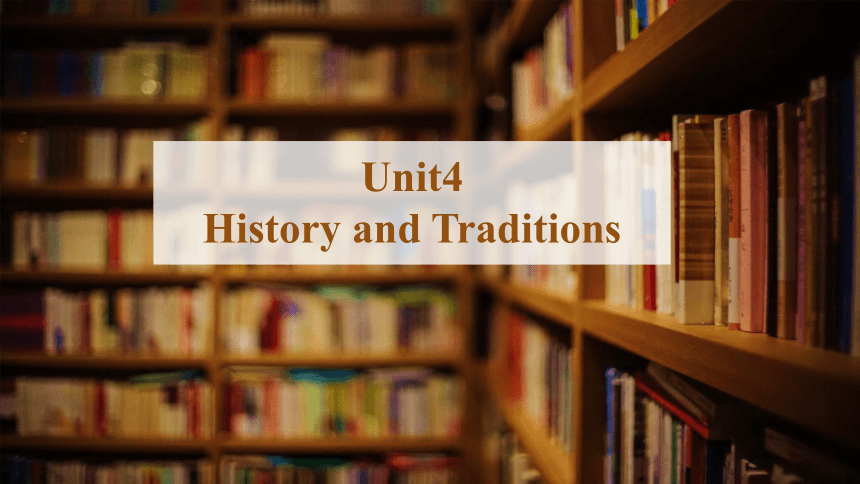 | |
| 格式 | zip | ||
| 文件大小 | 3.3MB | ||
| 资源类型 | 教案 | ||
| 版本资源 | 人教版(2019) | ||
| 科目 | 英语 | ||
| 更新时间 | 2022-05-27 10:36:52 | ||
图片预览


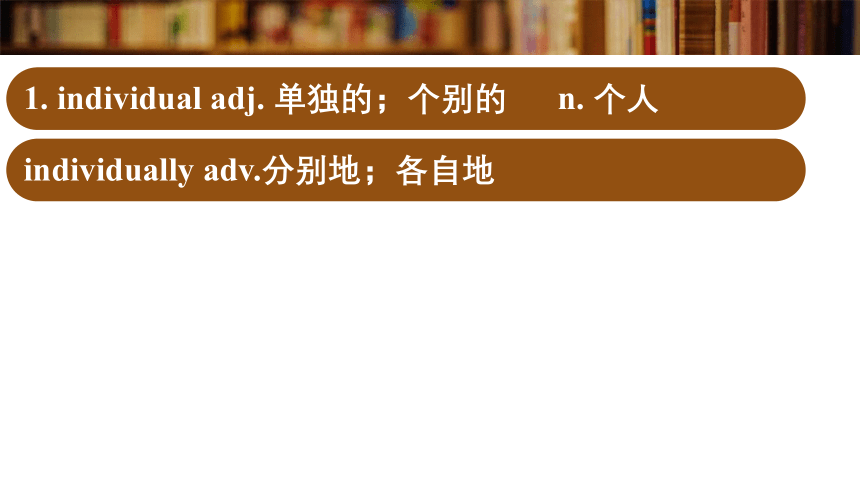

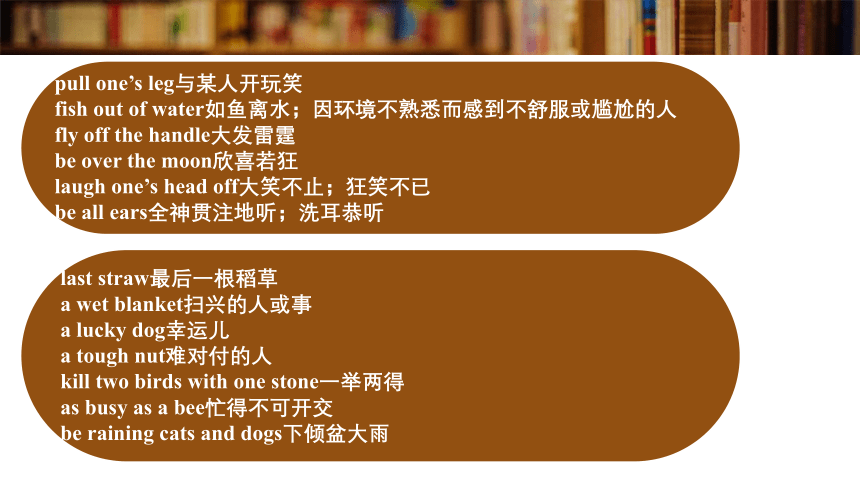
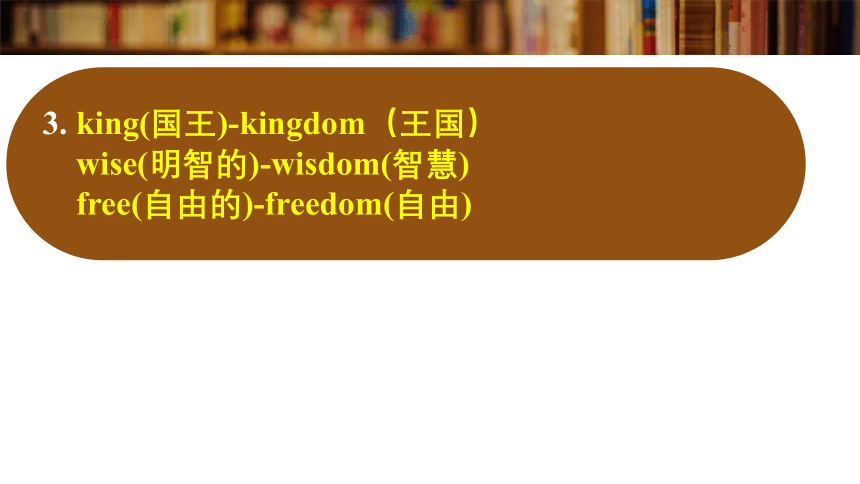
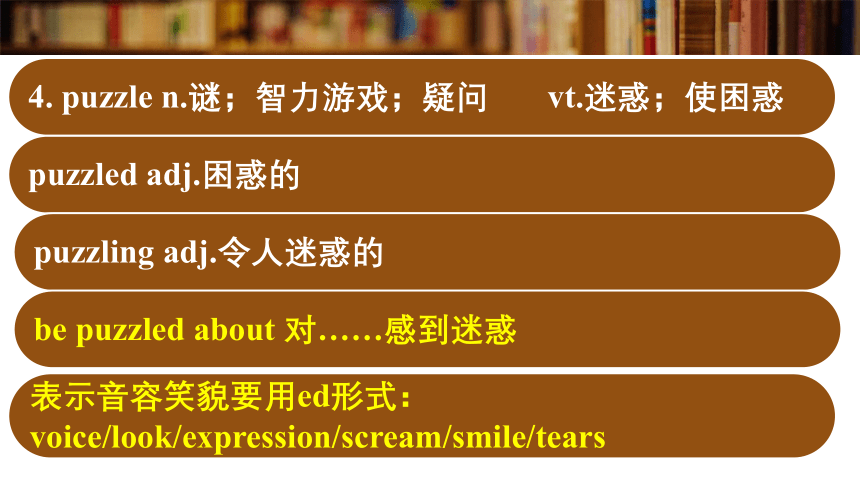
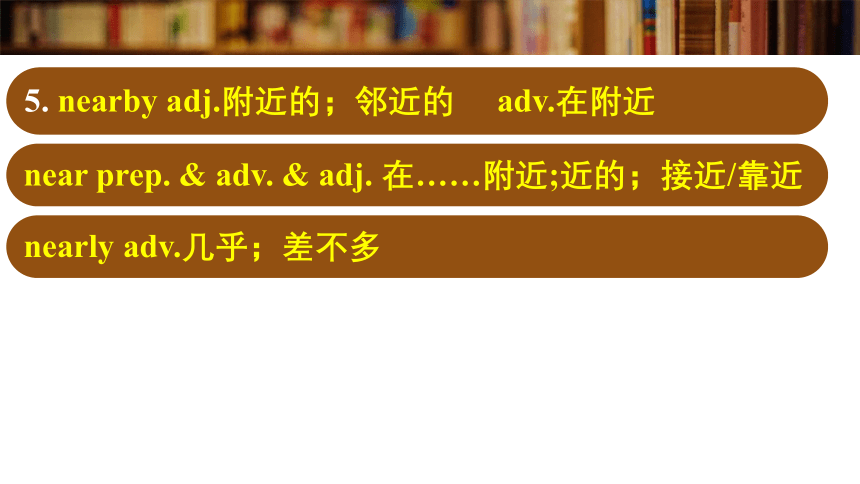
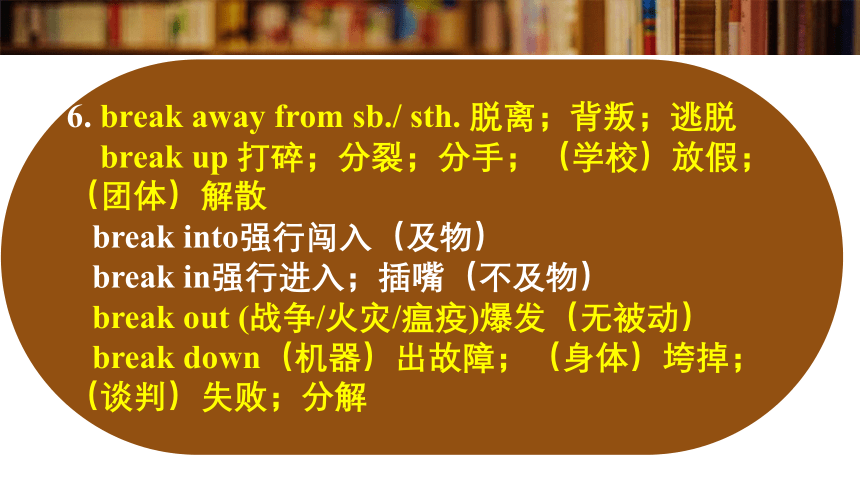
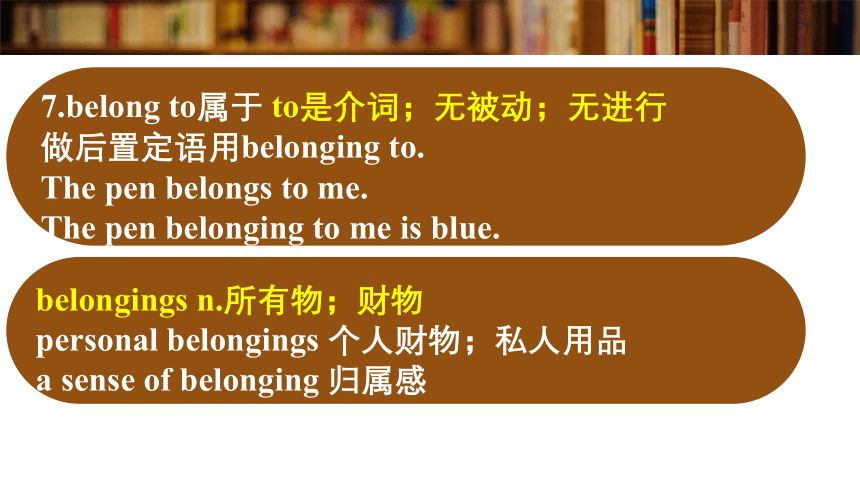

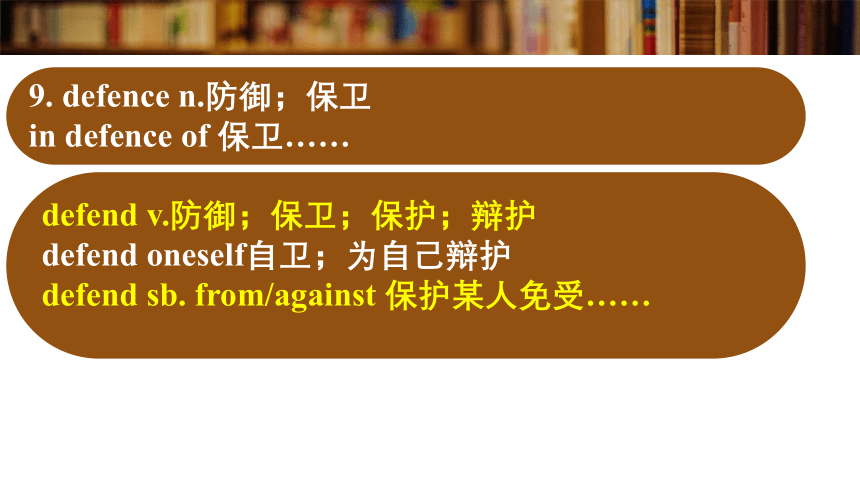
文档简介
(共62张PPT)
Unit4
History and Traditions
1
Vocabulary Expansion
1. individual adj. 单独的;个别的 n. 个人
individually adv.分别地;各自地
2. Achilles’ heel 阿喀琉斯的脚跟;致命的弱点
所有格表达方式:
一般情况下,直接+’s
以s结尾的+’
Tom’s and Jerry’s room
Tom and Jerry’s room
last straw最后一根稻草
a wet blanket扫兴的人或事
a lucky dog幸运儿
a tough nut难对付的人
kill two birds with one stone一举两得
as busy as a bee忙得不可开交
be raining cats and dogs下倾盆大雨
pull one’s leg与某人开玩笑
fish out of water如鱼离水;因环境不熟悉而感到不舒服或尴尬的人
fly off the handle大发雷霆
be over the moon欣喜若狂
laugh one’s head off大笑不止;狂笑不已
be all ears全神贯注地听;洗耳恭听
3. king(国王)-kingdom(王国)
wise(明智的)-wisdom(智慧)
free(自由的)-freedom(自由)
4. puzzle n.谜;智力游戏;疑问 vt.迷惑;使困惑
puzzled adj.困惑的
puzzling adj.令人迷惑的
be puzzled about 对……感到迷惑
表示音容笑貌要用ed形式:voice/look/expression/scream/smile/tears
5. nearby adj.附近的;邻近的 adv.在附近
near prep. & adv. & adj. 在……附近;近的;接近/靠近
nearly adv.几乎;差不多
6. break away from sb./ sth. 脱离;背叛;逃脱
break up 打碎;分裂;分手;(学校)放假;(团体)解散
break into强行闯入(及物)
break in强行进入;插嘴(不及物)
break out (战争/火灾/瘟疫)爆发(无被动)
break down(机器)出故障;(身体)垮掉;(谈判)失败;分解
7.belong to属于 to是介词;无被动;无进行
做后置定语用belonging to.
The pen belongs to me.
The pen belonging to me is blue.
belongings n.所有物;财物
personal belongings 个人财物;私人用品
a sense of belonging 归属感
8. as well as同;和;还
连接两个并列主语时,谓语动词遵循就前原则。
Tom as well as his friends ________(want) to go shopping.
as well 也;放在肯定句句末;无逗号
too 也;放在肯定句句末;有逗号
I am hungry as well.
=I am hungry, too.
may/might as well do sth.不妨做某事
wants
9. defence n.防御;保卫
in defence of 保卫……
defend v.防御;保卫;保护;辩护
defend oneself自卫;为自己辩护
defend sb. from/against 保护某人免受……
10. legal adj.合法的
legal-illegal
legally-illegally
11. surround vt. 围绕;包围
surround…with/by…用……包围……
be surrounded with/by…被……包围
surrounding adj.周围的
surroundings n.环境
12. evidence n.证据;证明(不可数)
There is some evidence that…
有一些证据表明……
evident adj.明显的;显然的
It is evident/obvious that…=Evidently, …
很明显……
13. location n.地方;地点;位置
the location of the factory工厂的位置
a convenient/an ideal/a suitable location方便的/理想的/合适的位置
locate vt.找出……的准确位置;定位
be located in/on/at……位于……/坐落于……
14. battle n.战役;搏斗
vi. & vt. 搏斗;奋斗
fight a/an battle打……的仗
battle against/with与……战斗
battle for为……而战
15. fascinating adj.极有吸引力的;迷人的
a fascinating book/story
look/sound fascinating看上去/听起来迷人
fascinated adj.入迷的;极感兴趣的
be fascinated by/with对……着迷
be fascinated to do sth.着迷于做某事
fascinate vt.&vi.深深吸引;迷住
16. keep your eyes open for 留心;留意
=keep an eye out for
fix one’s eyes on 注视;盯着看
keep an eye on 照看;留意;密切注意
look sb. in the eye(s) 正视某人
17. charge n.收费;指控;主管
vt. 收费;控告;充电
charge sb. for sth.为……向某人收费/要价
charge sb. with sth.指控某人某事
in charge of 主管/负责
=take charge of
in/under the charge of sb. 由……负责/掌管
=in one’s charge
free of charge免费
18. announce vt. 宣布;通知;声称
announce sth. to sb.向某人宣布某事
动词+sth. to sb.: explain/introduce/suggest/report sth. to sb.
It is/was announced that……据宣布……
It is +done that…:
It is reported/considered/thought/believed/suggested that…
as is announced正如宣布的那样
announcement n.通知;通告
make an announcement宣布;下通知
19. amount n.金额;数量
“a large amount of+不可数名词”做主语时,谓语动词用单数
“large amounts of+不可数名词”做主语时,谓语动词用复数
修饰不可数名词:a great deal of/a large amount of/large amounts of
修饰可数名词复数:a large number of
即可修饰可数名词,也可修饰不可数名词:a lot of/plenty of/a large quantity of
20. approach n.方法;途径;接近
vt.接近;接洽;着手处理
vi.靠近
an approach to (doing) sth.做某事的方法/途径
at the approach of在快到……的时候
make approaches to sb.接近某人/与某人打交道
21. position n.位置;姿态;职位
first/second position第一/二名
in/out of position在/不在适当的位置
put/place sb. in a good/an awkward position使某人处于有利的/尴尬的境地
当position/situation/point/case/stage等表示抽象地点的名词做先行词,且关系词在从句中作状语时,定从关系词用where引导。
22. eager adj.热切的;渴望的
be eager to do sth.渴望做某事
be eager for sth.渴求某事物
She is eager for success.
=She is eager to succeed.她渴望成功。
be eager to see/learn/hear that…
急于看到/了解/听说……
23. poet n.诗人
poetry n.诗歌
poem n.诗
24. feast n.盛宴;宴会;节日
a feast for the eyes一次视觉盛宴
25. cattle n.牛
形单意复: people/police/cattle
26. custom n.风俗;习俗;习惯
customs and habits风俗习惯
an old/ancient/local custom旧的/古老的/当地的习俗
It’s the custom (for sb.) to do sth.
(对某人来说)做某事是一种习俗
customs n.海关;关税
a customs officer 一名海关官员
27. striking adj.引人注目的;显著的
strike-struck-struck/stricken
打击;袭击;敲(钟);擦(火柴);突然想到
be struck by被袭击/被打动
Sth. strikes sb.=It strikes sb. that…某人突然想到
=It occurs to sb. that…
=It hits sb. that…
crowded adj.拥挤的;挤满的
a crowded street/bus
be crowded with 充满……,满是……
28. crowd n.人群;一群人;民众 vt.挤满;使……拥挤
a crowd of/crowds of 一群;许多
crowd into…挤进……
crowd in (on sb.) (想法/问题等)涌上(某人心头);涌入(某人脑海)
英汉互译
1. 对……感到困惑___________
2. 充满……______________
3. 被袭击/被打动_____________
4. 某人突然想起______________
5. 渴望做某事________________
6. 据宣布______________
7. 位于;坐落于________________
8.分手;打碎;分裂;分手;放假;解散________________
be confused about
be crowded with
be struck by
It strikes/occurs/hits sb. that…
be eager to do sth.
It is/was announced that…
be located in/on/at
break up
2
Reading and Thinking
标题:
1. 被用于
2. 第一个做某事的……
the + 序数词 +(n.)+ to do(动词不定式作后置定语)
3. 根据
Para 1.
1. 对……感到困惑
2. 如果有的话
3. 逐渐了解/认识
4. 一点儿;有点儿
5. 解开这个谜题
Para 2.
1. 邻国
2. 被加入到……
3. 被增添;被增加
4. 脱离;背叛;逃脱
5. 导致
6. 简称short(adj.)—shorten(v.)--shortened(adj.缩短的)
7. 被叫做;被称为
8. 被称作……
Para 3.
属于
团结协作
作为…而出名
和;同;还
国防
差异
prep.像……一样
Para 4.
被……包围
……的证据
接管;控制
在不同时期
贯穿整个历史;从始至终
留下;落后
使某事被做
对……做出改变/进行修改
Para 5.
make+宾语+adj.
一直追溯到
一直;一路上
遍及整个英国
一个引人入胜的结合
留心;留意
因做某事而惊奇
1.The text is mainly about __________.
learning about British English.
the origin of the British name.
learning about a country through history
the geography of the United Kingdom.
2.What happened in the 19th century
The nearby country of Wales was joined to the Kingdom of England.
The country Scotland was joined to create the Kingdom of Great Britain.
The Kingdom of Ireland was added to create the United Kingdom of Great Britain and Ireland.
The southern part of Ireland broke away from the UK.
3.Which of the following is the different area of the four countries
A. Flag. B. Currency. C. Military defence. D. Legal systems.
4.Who conquered England after the well-known Battle of Hastings
The Romans.
The Anglo-Saxons.
The Normans.
The Vikings.
3.What’s the author’s attitude towards studying the history
A. Neutral. B. Indifferent. C. Supportive. D. Doubtful.
True(T) or False(F).
1. All people are confused by what these different names mean. ( )
2. Getting to know a little about British history will be helpful. ( )
3. In the 18th century, Wales was joined to the Kingdom of England. ( )
F
T
F
不规则动词
动词原形
get
mean
refer
know
have
go
come
build
learn
make
动词过去式
got
meant
referred
knew
had
went
came
built
learnt/learned
made
动词过去分词
gotten
meant
referred
known
had
gone
come
built
learnt/learned
made
3
Reading for Writing
Para 1.
对……有极大的影响
历史悠久
感觉;意义
平静的风景
绿宝石岛
郡;县
一场名副其实的视觉盛宴
起伏的青山
9. 点缀着
10. ……的咆哮/吼叫
11. 组成;化妆;弥补;编造;和好
12. feel+宾语+介词短语
13. 吸入
14. 鲜花的芬芳
15.用……迎接……
16. 美;美人;美丽的事物
Para 2.
有机会做某事
顺便访问
一杯
更好的是
美味的爱尔兰传统炖牛肉
能够做某事
向某人介绍……
很可能做某事
9. 直接的;第一手的
不规则动词
动词原形
has
make
feel
stop
动词过去式
had
made
felt
stopped
动词过去分词
had
made
felt
stopped
4
Discovering Useful Structures
Done作定语和宾语补足语
Done作定语
Done作宾语补足语
位置:前置/后置
意义
done与doing作定语的区别
done/being done/to be done作定语的区别
系动词+宾语+done
使役动词+宾语+done
感官动词+宾语+done
希望/愿望/命令类动词+宾语+done
with+宾语+done
非谓语动词作宾补的区别
Done作定语的位置
过去分词作定语分为前置定语和后置定语。
The polluted water was unable to drink. 前置定语
There are few tigers left. 后置定语
1.单个过去分词作定语,一般前置。
2.特殊词必须后置:left(剩余的)/given(所给的)/concerned(有关的)
3.done修饰不定代词everything/somebody/anyone/nothing要后置。
4.过去分词短语作定语要后置。
Done作定语的位置注意事项:
Done作定语的意义:被动已完成
America is a developed country. 完成
I found it hard to understand the English spoken by the native villagers. 被动
Is there anything planned for the weekend 被动+完成
Done和Doing作定语的区别:
Done:被动已完成
Doing:主动进行
China is a developing country.主动进行
America is a developed country.被动完成
Done/being done/to be done作定语的区别:
语态 时态
done 被动 完成
being done 被动 进行
to be done 被动 未完成
The building built last year is our school.
The building being built now is our school.
The building to be built next month is our school.
Done作宾语补足语
1.系动词:keep/leave+宾语+done
2.使役动词:have/get/make+宾语+done
3.感官动词:see/hear/watch/notice/observe/feel/find+宾语+done
4.希望/愿望/命令等动词:like/want/wish/order/expect+宾语+done
5.with+宾语+done
非谓语动词作宾补的区别:
1.感官动词see/watch/observe/look at/notice/hear/listen to/feel等宾补的区别:
see+宾语+
doing sth. 看到某人正在做某事
do sth. 看到某人做某事的全过程
done sth. 看到某事/人被……
非谓语动词作宾补的区别:
2.使役动词make/have/get/keep 等宾补的区别:
have+宾语+
doing sth. 让某人一直做某事
do sth. 让某人做某事
done sth. 使……被做
非谓语动词作宾补的区别:
3.with复合结构中宾补的区别:
with+宾语+
doing sth. 主动进行
to do sth. 目的未完成
done sth. 被动完成
Done和Doing作定语的区别:
Done:被动已完成
Doing:主动进行
China is a developing country.主动进行
America is a developed country.被动完成
练习:
1.With all his lessons __________(prepare), Peter went to bed, relaxed.
2.When he woke up, he found himself ___________(surround) by a group of children.
3.The student likes reading stories __________(write) by the famous writer.
4.Many ___________(use) computers will be sold in this market.
5.I’ve heard it __________(say) that Elizabeth is a tough business woman.
prepared
surrounded
written
used
said
练习:
6.The police promised that they would keep the relatives of the victim ___________(inform) of everything about the investigation.
7.He’s a good watch repairman and can get the clock __________(go) again.
8.The girl answered the question in such a low voice that she couldn’t make herself __________(hear) by others.
9.Don’t leave that man over there ___________(wait) outside and show him in now.
10. I like that old private house __________(build) of wood and mud.
informed
going
heard
waiting
built
THANK YOU
Unit4
History and Traditions
1
Vocabulary Expansion
1. individual adj. 单独的;个别的 n. 个人
individually adv.分别地;各自地
2. Achilles’ heel 阿喀琉斯的脚跟;致命的弱点
所有格表达方式:
一般情况下,直接+’s
以s结尾的+’
Tom’s and Jerry’s room
Tom and Jerry’s room
last straw最后一根稻草
a wet blanket扫兴的人或事
a lucky dog幸运儿
a tough nut难对付的人
kill two birds with one stone一举两得
as busy as a bee忙得不可开交
be raining cats and dogs下倾盆大雨
pull one’s leg与某人开玩笑
fish out of water如鱼离水;因环境不熟悉而感到不舒服或尴尬的人
fly off the handle大发雷霆
be over the moon欣喜若狂
laugh one’s head off大笑不止;狂笑不已
be all ears全神贯注地听;洗耳恭听
3. king(国王)-kingdom(王国)
wise(明智的)-wisdom(智慧)
free(自由的)-freedom(自由)
4. puzzle n.谜;智力游戏;疑问 vt.迷惑;使困惑
puzzled adj.困惑的
puzzling adj.令人迷惑的
be puzzled about 对……感到迷惑
表示音容笑貌要用ed形式:voice/look/expression/scream/smile/tears
5. nearby adj.附近的;邻近的 adv.在附近
near prep. & adv. & adj. 在……附近;近的;接近/靠近
nearly adv.几乎;差不多
6. break away from sb./ sth. 脱离;背叛;逃脱
break up 打碎;分裂;分手;(学校)放假;(团体)解散
break into强行闯入(及物)
break in强行进入;插嘴(不及物)
break out (战争/火灾/瘟疫)爆发(无被动)
break down(机器)出故障;(身体)垮掉;(谈判)失败;分解
7.belong to属于 to是介词;无被动;无进行
做后置定语用belonging to.
The pen belongs to me.
The pen belonging to me is blue.
belongings n.所有物;财物
personal belongings 个人财物;私人用品
a sense of belonging 归属感
8. as well as同;和;还
连接两个并列主语时,谓语动词遵循就前原则。
Tom as well as his friends ________(want) to go shopping.
as well 也;放在肯定句句末;无逗号
too 也;放在肯定句句末;有逗号
I am hungry as well.
=I am hungry, too.
may/might as well do sth.不妨做某事
wants
9. defence n.防御;保卫
in defence of 保卫……
defend v.防御;保卫;保护;辩护
defend oneself自卫;为自己辩护
defend sb. from/against 保护某人免受……
10. legal adj.合法的
legal-illegal
legally-illegally
11. surround vt. 围绕;包围
surround…with/by…用……包围……
be surrounded with/by…被……包围
surrounding adj.周围的
surroundings n.环境
12. evidence n.证据;证明(不可数)
There is some evidence that…
有一些证据表明……
evident adj.明显的;显然的
It is evident/obvious that…=Evidently, …
很明显……
13. location n.地方;地点;位置
the location of the factory工厂的位置
a convenient/an ideal/a suitable location方便的/理想的/合适的位置
locate vt.找出……的准确位置;定位
be located in/on/at……位于……/坐落于……
14. battle n.战役;搏斗
vi. & vt. 搏斗;奋斗
fight a/an battle打……的仗
battle against/with与……战斗
battle for为……而战
15. fascinating adj.极有吸引力的;迷人的
a fascinating book/story
look/sound fascinating看上去/听起来迷人
fascinated adj.入迷的;极感兴趣的
be fascinated by/with对……着迷
be fascinated to do sth.着迷于做某事
fascinate vt.&vi.深深吸引;迷住
16. keep your eyes open for 留心;留意
=keep an eye out for
fix one’s eyes on 注视;盯着看
keep an eye on 照看;留意;密切注意
look sb. in the eye(s) 正视某人
17. charge n.收费;指控;主管
vt. 收费;控告;充电
charge sb. for sth.为……向某人收费/要价
charge sb. with sth.指控某人某事
in charge of 主管/负责
=take charge of
in/under the charge of sb. 由……负责/掌管
=in one’s charge
free of charge免费
18. announce vt. 宣布;通知;声称
announce sth. to sb.向某人宣布某事
动词+sth. to sb.: explain/introduce/suggest/report sth. to sb.
It is/was announced that……据宣布……
It is +done that…:
It is reported/considered/thought/believed/suggested that…
as is announced正如宣布的那样
announcement n.通知;通告
make an announcement宣布;下通知
19. amount n.金额;数量
“a large amount of+不可数名词”做主语时,谓语动词用单数
“large amounts of+不可数名词”做主语时,谓语动词用复数
修饰不可数名词:a great deal of/a large amount of/large amounts of
修饰可数名词复数:a large number of
即可修饰可数名词,也可修饰不可数名词:a lot of/plenty of/a large quantity of
20. approach n.方法;途径;接近
vt.接近;接洽;着手处理
vi.靠近
an approach to (doing) sth.做某事的方法/途径
at the approach of在快到……的时候
make approaches to sb.接近某人/与某人打交道
21. position n.位置;姿态;职位
first/second position第一/二名
in/out of position在/不在适当的位置
put/place sb. in a good/an awkward position使某人处于有利的/尴尬的境地
当position/situation/point/case/stage等表示抽象地点的名词做先行词,且关系词在从句中作状语时,定从关系词用where引导。
22. eager adj.热切的;渴望的
be eager to do sth.渴望做某事
be eager for sth.渴求某事物
She is eager for success.
=She is eager to succeed.她渴望成功。
be eager to see/learn/hear that…
急于看到/了解/听说……
23. poet n.诗人
poetry n.诗歌
poem n.诗
24. feast n.盛宴;宴会;节日
a feast for the eyes一次视觉盛宴
25. cattle n.牛
形单意复: people/police/cattle
26. custom n.风俗;习俗;习惯
customs and habits风俗习惯
an old/ancient/local custom旧的/古老的/当地的习俗
It’s the custom (for sb.) to do sth.
(对某人来说)做某事是一种习俗
customs n.海关;关税
a customs officer 一名海关官员
27. striking adj.引人注目的;显著的
strike-struck-struck/stricken
打击;袭击;敲(钟);擦(火柴);突然想到
be struck by被袭击/被打动
Sth. strikes sb.=It strikes sb. that…某人突然想到
=It occurs to sb. that…
=It hits sb. that…
crowded adj.拥挤的;挤满的
a crowded street/bus
be crowded with 充满……,满是……
28. crowd n.人群;一群人;民众 vt.挤满;使……拥挤
a crowd of/crowds of 一群;许多
crowd into…挤进……
crowd in (on sb.) (想法/问题等)涌上(某人心头);涌入(某人脑海)
英汉互译
1. 对……感到困惑___________
2. 充满……______________
3. 被袭击/被打动_____________
4. 某人突然想起______________
5. 渴望做某事________________
6. 据宣布______________
7. 位于;坐落于________________
8.分手;打碎;分裂;分手;放假;解散________________
be confused about
be crowded with
be struck by
It strikes/occurs/hits sb. that…
be eager to do sth.
It is/was announced that…
be located in/on/at
break up
2
Reading and Thinking
标题:
1. 被用于
2. 第一个做某事的……
the + 序数词 +(n.)+ to do(动词不定式作后置定语)
3. 根据
Para 1.
1. 对……感到困惑
2. 如果有的话
3. 逐渐了解/认识
4. 一点儿;有点儿
5. 解开这个谜题
Para 2.
1. 邻国
2. 被加入到……
3. 被增添;被增加
4. 脱离;背叛;逃脱
5. 导致
6. 简称short(adj.)—shorten(v.)--shortened(adj.缩短的)
7. 被叫做;被称为
8. 被称作……
Para 3.
属于
团结协作
作为…而出名
和;同;还
国防
差异
prep.像……一样
Para 4.
被……包围
……的证据
接管;控制
在不同时期
贯穿整个历史;从始至终
留下;落后
使某事被做
对……做出改变/进行修改
Para 5.
make+宾语+adj.
一直追溯到
一直;一路上
遍及整个英国
一个引人入胜的结合
留心;留意
因做某事而惊奇
1.The text is mainly about __________.
learning about British English.
the origin of the British name.
learning about a country through history
the geography of the United Kingdom.
2.What happened in the 19th century
The nearby country of Wales was joined to the Kingdom of England.
The country Scotland was joined to create the Kingdom of Great Britain.
The Kingdom of Ireland was added to create the United Kingdom of Great Britain and Ireland.
The southern part of Ireland broke away from the UK.
3.Which of the following is the different area of the four countries
A. Flag. B. Currency. C. Military defence. D. Legal systems.
4.Who conquered England after the well-known Battle of Hastings
The Romans.
The Anglo-Saxons.
The Normans.
The Vikings.
3.What’s the author’s attitude towards studying the history
A. Neutral. B. Indifferent. C. Supportive. D. Doubtful.
True(T) or False(F).
1. All people are confused by what these different names mean. ( )
2. Getting to know a little about British history will be helpful. ( )
3. In the 18th century, Wales was joined to the Kingdom of England. ( )
F
T
F
不规则动词
动词原形
get
mean
refer
know
have
go
come
build
learn
make
动词过去式
got
meant
referred
knew
had
went
came
built
learnt/learned
made
动词过去分词
gotten
meant
referred
known
had
gone
come
built
learnt/learned
made
3
Reading for Writing
Para 1.
对……有极大的影响
历史悠久
感觉;意义
平静的风景
绿宝石岛
郡;县
一场名副其实的视觉盛宴
起伏的青山
9. 点缀着
10. ……的咆哮/吼叫
11. 组成;化妆;弥补;编造;和好
12. feel+宾语+介词短语
13. 吸入
14. 鲜花的芬芳
15.用……迎接……
16. 美;美人;美丽的事物
Para 2.
有机会做某事
顺便访问
一杯
更好的是
美味的爱尔兰传统炖牛肉
能够做某事
向某人介绍……
很可能做某事
9. 直接的;第一手的
不规则动词
动词原形
has
make
feel
stop
动词过去式
had
made
felt
stopped
动词过去分词
had
made
felt
stopped
4
Discovering Useful Structures
Done作定语和宾语补足语
Done作定语
Done作宾语补足语
位置:前置/后置
意义
done与doing作定语的区别
done/being done/to be done作定语的区别
系动词+宾语+done
使役动词+宾语+done
感官动词+宾语+done
希望/愿望/命令类动词+宾语+done
with+宾语+done
非谓语动词作宾补的区别
Done作定语的位置
过去分词作定语分为前置定语和后置定语。
The polluted water was unable to drink. 前置定语
There are few tigers left. 后置定语
1.单个过去分词作定语,一般前置。
2.特殊词必须后置:left(剩余的)/given(所给的)/concerned(有关的)
3.done修饰不定代词everything/somebody/anyone/nothing要后置。
4.过去分词短语作定语要后置。
Done作定语的位置注意事项:
Done作定语的意义:被动已完成
America is a developed country. 完成
I found it hard to understand the English spoken by the native villagers. 被动
Is there anything planned for the weekend 被动+完成
Done和Doing作定语的区别:
Done:被动已完成
Doing:主动进行
China is a developing country.主动进行
America is a developed country.被动完成
Done/being done/to be done作定语的区别:
语态 时态
done 被动 完成
being done 被动 进行
to be done 被动 未完成
The building built last year is our school.
The building being built now is our school.
The building to be built next month is our school.
Done作宾语补足语
1.系动词:keep/leave+宾语+done
2.使役动词:have/get/make+宾语+done
3.感官动词:see/hear/watch/notice/observe/feel/find+宾语+done
4.希望/愿望/命令等动词:like/want/wish/order/expect+宾语+done
5.with+宾语+done
非谓语动词作宾补的区别:
1.感官动词see/watch/observe/look at/notice/hear/listen to/feel等宾补的区别:
see+宾语+
doing sth. 看到某人正在做某事
do sth. 看到某人做某事的全过程
done sth. 看到某事/人被……
非谓语动词作宾补的区别:
2.使役动词make/have/get/keep 等宾补的区别:
have+宾语+
doing sth. 让某人一直做某事
do sth. 让某人做某事
done sth. 使……被做
非谓语动词作宾补的区别:
3.with复合结构中宾补的区别:
with+宾语+
doing sth. 主动进行
to do sth. 目的未完成
done sth. 被动完成
Done和Doing作定语的区别:
Done:被动已完成
Doing:主动进行
China is a developing country.主动进行
America is a developed country.被动完成
练习:
1.With all his lessons __________(prepare), Peter went to bed, relaxed.
2.When he woke up, he found himself ___________(surround) by a group of children.
3.The student likes reading stories __________(write) by the famous writer.
4.Many ___________(use) computers will be sold in this market.
5.I’ve heard it __________(say) that Elizabeth is a tough business woman.
prepared
surrounded
written
used
said
练习:
6.The police promised that they would keep the relatives of the victim ___________(inform) of everything about the investigation.
7.He’s a good watch repairman and can get the clock __________(go) again.
8.The girl answered the question in such a low voice that she couldn’t make herself __________(hear) by others.
9.Don’t leave that man over there ___________(wait) outside and show him in now.
10. I like that old private house __________(build) of wood and mud.
informed
going
heard
waiting
built
THANK YOU
